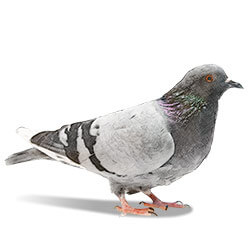Identification
- Colour Blue-grey plumage with iridescent throat feathers
- Size From 29 cm to 37 cm in length, with a wingspan of 62 cm to 72 cm
- Also known as Rock dove, Rock pigeon
- Description Have dark, blue-grey heads with glossy yellow, greenish and reddish-purple markings along their neck and wing feathers. Their tail is usually dark tipped.

How to identify Pigeons
Pigeons are a common sight in urban environments. The “Rock Dove” or “Rock Pigeon” will be a familiar species to Canadians, with pale grey feathers with two black bars on each wing. Pigeons are one of the world oldest domesticated birds. Many have been used to carry important messages during times of war and have even been decorated for their service in saving lives. However, advances in transportation and communication technology have all but wiped out jobs for carrier pigeons. Feral pigeons have dark, blue-gray heads with glossy yellow, greenish and reddish-purple markings along their neck and wing feathers. Today, pigeons are considered a nuisance and an urban pest by residents and commuters.
How to prevent Pigeons from invading
Eliminate food sources, including bird feeders for other species, Repair and seal any exterior cavities where birds can nest, Place fake statuettes of predatory birds near ledges, Generate loud noises and/or water sprays to scare them away
Habitat, Diet, and Life Cycle
A day in the life of a pigeon
A pigeon’s normal gait includes a very characteristic motion of the head, appearing to move rhythmically forwards and backwards. Some studies have suggested that this habit aids in stabilizing their visual surroundings. In 1978, Dr. Barrie J. Frost ran an experiment in which a pigeon was made to walk on a treadmill. Since the pigeon was effectively running in one place, it’s head did not “bob”.
Pigeons are monogamous birds and mate for life. Both parents incubate the eggs and care for nestlings. The males build nests along coastal cliffs as well as artificial cliffs created by tall urban buildings with accessible ledges and roof spaces.
Pigeons do not have natural defense mechanisms to protect against predators. Their ability to fly is the only thing between them and predators on land which includes opossums and raccoons. However, pigeons are often captured by predatory birds such as Peregrine Falcons, Red-tailed Hawks, and the Easter Screech Owls. Young pigeons and their eggs are also threatened by the exploding population of domestic and feral cats. Despite being on nearly every predator’s menu, pigeon populations are not in any danger of vanishing.
Commonly Asked Questions
Why do I have pigeons?
The pigeon, also called the rock dove or rock pigeon, builds nests along coastal cliffs, as well as artificial cliffs created by tall urban buildings with accessible ledges and roof spaces.
In rural areas, they will eat grass seeds, berries, insects, and spiders.In urban environments, they will scavenge anything they can find, including dropped food, stale bread discarded by restaurants and supermarkets, and bird seed handed out by tourists.
How worried should I be about pigeons?
Pigeons transmit potentially fatal diseases, including chlamydiosis, histoplasmosis, yersiniosis, salmonellosis, toxoplasmosis, and tuberculosis. Their feces often contain the fungal disease cryptococcosis, which is especially dangerous for people with compromised immune systems.
Pigeons are almost universally considered a nuisance and urban pest. However, it’s still crucial to ensure you follow regulations when removing these birds. A professional, licensed pest control service will make sure your pigeon problem is eliminated legally.
Other pests related to Pigeons
100% Satisfaction or Money Back Guarantee
Resolving your pest problem is our #1 priority. If re-treatment is required, we'll provide immediate services at no extra cost. If your expectations are not met, we guarantee a full refund of your service payment.
Remove pests from your home, and stop them from coming back
We work hard to listen, understand and assess your unique situation. Request a free, no-obligation estimate today for a customized pest program that fits your needs.
Request a Free Home EstimateRequest a Free Business Consultation

